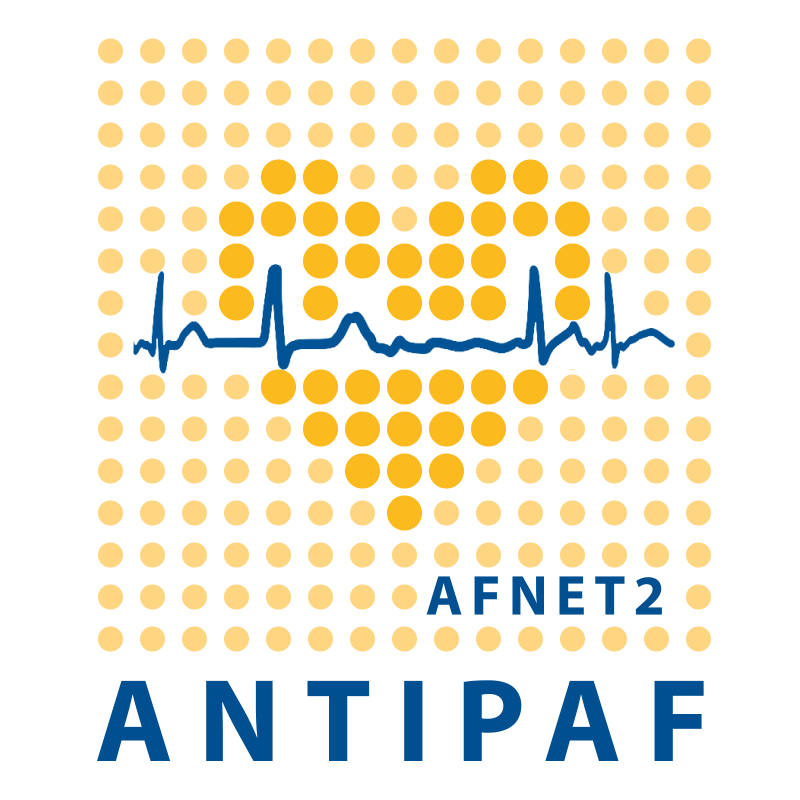
ANTIPAF-AFNET 2
Angiotensin II-Antagonist in Paroxysmal Atrial Fibrillation Trial (ANTIPAF Trial)
Study design
Prospective, randomized, placebo-controlled, multicenter trial analyzing the AF burden (percentage of days with documented episodes of paroxysmal AF) during a 12-month follow-up as the primary study end point. Four hundred thirty patients with documented paroxysmal AF without structural heart disease were randomized to placebo or 40 mg olmesartan per day.

Inclusion Criteria
![]() Documented paroxysmal atrial fibrillation: ECG documentation of atrial fibrillation at least in one ECG recorded during the last 2 months prior to randomization plus additional ECG recording of sinus rhythm at least 12 hours after the above mentioned ECG documentation.
Documented paroxysmal atrial fibrillation: ECG documentation of atrial fibrillation at least in one ECG recorded during the last 2 months prior to randomization plus additional ECG recording of sinus rhythm at least 12 hours after the above mentioned ECG documentation.
![]() Age ≥ 18
Age ≥ 18
![]() Patient informed orally and in writing
Patient informed orally and in writing
![]() Written informed consent of the patient
Written informed consent of the patient
Exclusion Criteria
![]() Strong clinical evidence for therapy with AT II/ACE inhibitors
Strong clinical evidence for therapy with AT II/ACE inhibitors
![]() AT II/ACE inhibitor therapy within the last month
AT II/ACE inhibitor therapy within the last month
![]() Therapy with antiarrhythmic agents of class I or class III within the last month, therapy with amiodarone within the last 3 months
Therapy with antiarrhythmic agents of class I or class III within the last month, therapy with amiodarone within the last 3 months
![]() Direct current (DC) cardioversion within the last 3 months
Direct current (DC) cardioversion within the last 3 months
![]() Symptomatic bradycardia
Symptomatic bradycardia
![]() Implanted pacemaker or implanted cardioverter/defibrillator with any antitachycardiac algorithm in use
Implanted pacemaker or implanted cardioverter/defibrillator with any antitachycardiac algorithm in use
![]() Cardiac surgery or cardiac catheter ablation within the last 3 months
Cardiac surgery or cardiac catheter ablation within the last 3 months
![]() Typical angina pectoris symptoms at rest or during exercise
Typical angina pectoris symptoms at rest or during exercise
![]() Known coronary artery disease with indication for intervention
Known coronary artery disease with indication for intervention
![]() Valvular disease > II degree
Valvular disease > II degree
![]() Left ventricular ejection fraction < 40%
Left ventricular ejection fraction < 40%
![]() Diastolic blood pressure > 110mm Hg at rest
Diastolic blood pressure > 110mm Hg at rest
![]() Symptomatic arterial hypotension
Symptomatic arterial hypotension
![]() Known renal artery stenosis
Known renal artery stenosis
![]() Serum creatinine > 1.8 mval/l
Serum creatinine > 1.8 mval/l
![]() Relevant hepatic or pulmonary disorders
Relevant hepatic or pulmonary disorders
![]() Hyperthyroidism manifested clinically and in laboratory
Hyperthyroidism manifested clinically and in laboratory
![]() Known drug intolerance for AT II inhibitors
Known drug intolerance for AT II inhibitors
![]() Females who are pregnant or breast feeding
Females who are pregnant or breast feeding
![]() Females of childbearing potential who are not using a scientifically accepted method of contraception
Females of childbearing potential who are not using a scientifically accepted method of contraception
![]() Participation in a clinical trial within the last 30 days
Participation in a clinical trial within the last 30 days
![]() Drug addiction or chronic alcohol abuse
Drug addiction or chronic alcohol abuse
![]() Legal incapacity, or other circumstances which would prevent the patient from understanding the aim, nature or extent of the clinical study
Legal incapacity, or other circumstances which would prevent the patient from understanding the aim, nature or extent of the clinical study
![]() Evidence of an uncooperative attitude
Evidence of an uncooperative attitude
hypothesis
Blocking the angiotensin (AT) II type 1 receptor (Olmesartan) reduces the incidence of episodes of atrial fibrillation in patients with paroxysmal atrial fibrillation during 12 months by more than 25% compared to standard medication without angiotensin II type 1 receptor.
Conclusion
The study hypothesis could not be proven. Regarding atrial fibrillation burden, the study showed no significant difference between olmesartan and placebo. However, the time to prescription of amiodarone was longer in patients treated with olmesartan than in those receiving placebo. In patients with atrial fibrillation and an additional structural heart disease such as hypertension or systolic heart failure, angiotensin II receptor blockers are an effective adjunctive therapy. However, ANTIPAF – AFNET 2 clearly shows that these substances are not suitable for preventing paroxysmal atrial fibrillation in patients without structural heart disease.
PATIENTS
STUDY Sites
Study duration
Start of study
2005
End of study
2009
Publications
Goette A, Schön N, Kirchhof P, Breithardt G, Fetsch T, Häusler KG, Klein HU, Steinbeck G, Wegscheider K, Meinertz T. Angiotensin II-Antagonist in Paroxysmal Atrial Fibrillation (ANTIPAF)-Trial. Circ Arrhythm Electrophysiol. 2012; 5;43-51. DOI:10.1161/CIRCEP.111.965178
von Eisenhart Rothe A, Bielitzer M, Meinertz T, Limbourg T, Ladwig KH, Goette A. Predictors of discordance between physicians’ and patients’ appraisals of health-related quality of life in atrial fibrillation patients: Findings from the Angiotensin II Antagonist in Paroxysmal Atrial Fibrillation Trial. Am Heart J. 2013 Sep;166(3):589-596.e1. doi: 10.1016/j.ahj.2013.05.020.
Okutucu S, Katircioglu-Öztürk D, Oto E, Güvenir HA, Karaagaoglu E, Oto A, Meinertz T, Goette A. Data mining experiments on the Angiotensin II-Antagonist in Paroxysmal Atrial Fibrillation (ANTIPAF-AFNET 2) trial: ‘exposing the invisible’. Europace. 2017 May 1; 19 (5):741 – 746. pii: euw084. doi: 10.1093/europace/euw084 . Epub 2016 Oct 11.
Scientific Leader

Prof. Thomas Meinertz
Hamburg

Prof. Andreas Goette
Magdeburg
More information
Registration
http://clinicaltrials.gov/show/NCT00098137
Support
The trial is supported by German Federal Ministry of Education and Research
Sponsor
Kompetenznetz Vorhofflimmern e.V. (Atrial Fibrillation NETwork, AFNET), Münster, Germany